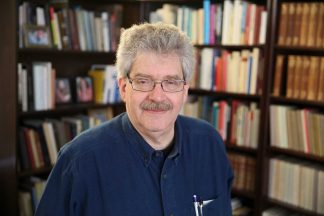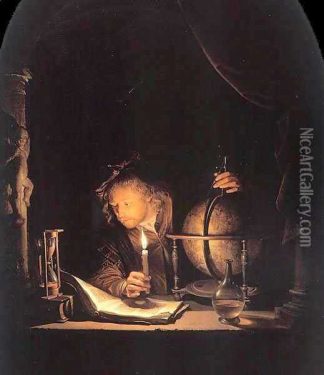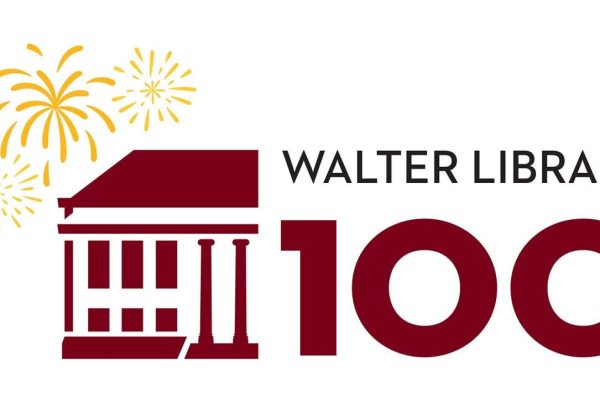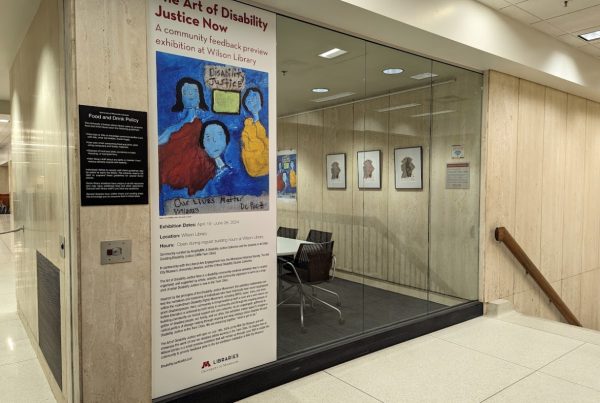By Allison Campbell-Jensen
Before James “Jim” Parente himself appears for a Zoom meeting, you may spot another side of him, illustrated by a 17th-century Dutch painting of a scholar studying by candlelight, late at night. The image shows his preferred role. Other than electric lighting and a computer, his late nights of research resemble those of this scholar from his favorite region of Northern Europe and favored time, the early modern period (1400-1750).
Parente has filled several other roles, however, in his long tenure with the University of Minnesota, including Dean of the College of Liberal Arts, Chair of the Department of German, Nordic, Slavic, & Dutch, Director of the Center for German and European Studies, and a member of the Friends of the Libraries board. After six years on the Friends board, he recently stepped down. Juggling his teaching and administration schedule with Friends board meetings and committee meetings was always challenging, yet he made an impact.
Invited to the Friends board by Ted Farmer, a now-retired professor of Asian history, Parente initially served on the events committee, then moved onto the group that weighs applications for Outstanding Library Student Employees and professional development grants for staff. (Meet the 2022 award-winning Libraries student employees.)
“Jim was always very prepared in his analysis of the contributions student workers made per the assessment of their supervisors,” says Linda Greve, former Friends staff member who worked with Parente on the awards committee. “He spent a good deal of time explaining the reasoning behind his recommendations.”
His viewpoint as a faculty member was valued highly by his fellow committee members, adds Greve, who retired in 2021. He also strove to streamline the committee’s work, based on his experience in CLA.
“The Libraries are the laboratories for people in the humanities,” says Parente, so he wanted to be involved as a Friend. And, this fall, he plans to begin a phased retirement that will allow him to focus on his research. “And, of course, I need the Libraries for that.”
After all, he needs to keep up: History is by no means a dead subject; it changes all the time.
No more ‘golden age’
“The Libraries are the laboratories for people in the humanities.”
—Jim Parente
New, exciting, and long-overdue questions are being asked in early modern studies, Parente says. For the past 20 years, Renaissance scholars have been deeply engaged in rethinking the so-called “Age of European Expansion,” and the devastating social, cultural, and economic impact that those voyages of exploration, and ultimately exploitation, had on indigenous peoples and cultures across the globe.
But the global outrage surrounding the murder of George Floyd — and the ensuing conversations about institutionalized racism and calls for social justice — greatly accelerated the reshaping of the field.
In his own area of early modern Dutch studies, for example, it was customary to talk about the “Dutch Golden Age” — the era in which the works of painters such as Rembrandt and Vermeer created their masterpieces, and the new Dutch Republic with Amsterdam at its center, arose as a global empire.
“But people started to question that: Where did all that money come from to fund this glory?,” notes Parente.
In recent times, scholars have more closely examined Dutch colonial activities in what was called the East Indies and the Dutch participation in the trade of enslaved people across the Atlantic Ocean and the globe, which fueled the Netherlands’ expansion of its affluence, culture, and the arts.
Parente notes: “No one says ‘The Dutch Golden Age’ anymore.” This confrontation with a difficult past is one that affects many different parts of the world from North America and the Caribbean to Africa and South and Southeast Asia.
“The debates are still continuing,” he adds, “and we have much to learn from this new and invaluable work.”
Marguerite Ragnow, Curator of the James Ford Bell Library, and formerly the Associate Director for the Center for Early Modern History, knows Parente well.
“Jim is an intellectual,” she says. “He’s really interested in these meaty issues and thinks about them. It’s not about the hottest thing or the sexiest thing.”
She and Parente have collaborated on exhibitions, symposia, and panels with other scholars.
Parente was particularly helpful for Ragnow when she was conducting background research for a Bell Library exhibit commemorating the 500th anniversary of the publication of the Theuerdank in 2017, a romanticized travel narrative authored by the Holy Roman emperor, Maximilian I (1459-1519). Parente knew about the scholars and courtiers in Maximilian’s circle, and the extraordinary life of his wife-to-be, Mary of Burgundy (1457-1482).
“Jim recognized the royal court as a place where art and literature came together,” she says. The James Ford Bell Library will re-visit some of these materials in its fall exhibition, the Art of the Travel Narrative, which opens in September. On Oct. 27, U of M Art History Professor Michael Gaudio, who has written eloquently on early modern global culture, will present a lecture on the art of travel literature.
The value of history and the humanities
“Jim is an intellectual. He’s really interested in these meaty issues and thinks about them. It’s not about the hottest thing or the sexiest thing.”
—Marguerite Ragnow, Curator, James Ford Bell Library
While he served in the Dean’s office of CLA, first as associate dean for faculty and research from 2000-2007, and then as Dean of the College until 2013, Parente gained an appreciation for many different fields besides his own. For several years, the college was hiring up to 50 new faculty a year, and as associate dean, he would always meet with at least three finalists for each position.
“I had this extraordinary opportunity to meet with some of the rising stars in the humanities, social sciences, and the creative arts, many of whom we hired,” Parente recalls. “I learned much from them in the initial interview, and they, along with many other CLA faculty, continued to teach me through their publications, their campus lectures, and individual conversations about their own projects, the ways in which their fields were changing, and the new research questions to be asked.”
He especially enjoyed bringing scholars and artists together for cross-disciplinary conversations, and then helping them to create similar opportunities for their graduate and undergraduate students.
Although institutional support for the humanities has been reduced at many colleges and universities, research in the field is flourishing, and the importance of the humanities remains undiminished. Historical circumstances continually reinforce the value of the humanities as pertinent areas of study.
“When 9/11 happened, who did you call? You called historians, and scholars of religion and language experts. That was transformative,” he says.
In 2001, very few people were studying Arabic, Parente says, but now it is understandably in great demand. He enthusiastically welcomes the revival of language studies and multicultural approaches to European and global history.
“It gives me hope that the humanities will continue to thrive, as we need them even more than before in our increasingly challenging times.”
His straightforward, purposeful thought processes have benefitted his peers on the Friends board, says Lanaya Stangret, Friends Coordinator. She looks forward to taking advantage of his experiences and his collaborative nature even when he is “retired” and still burning the midnight oil.






